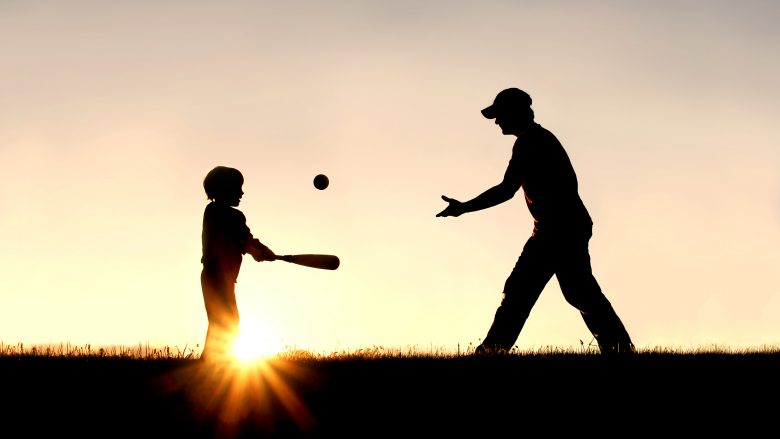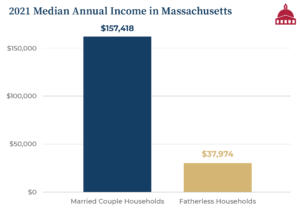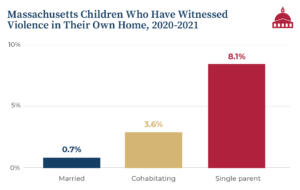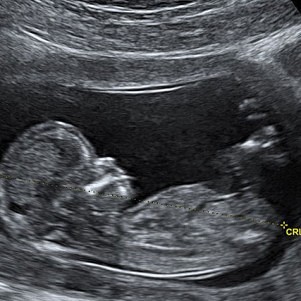Massachusetts Needs Fathers
By Andrew Beckwith | June 14, 2023, 11:21 EDT

Massachusetts Family Institute has been dedicated to strengthening the family in the Commonwealth for 30 years. The latest census data and social science research confirm that children do best when they are raised in a home with both their mother and their father, and it is part of our mission to ensure that those facts get a hearing.
In June 2008, then-presidential-candidate Barack Obama addressed the crisis of fatherlessness by lamenting that “[w]e know the statistics – that children who grow up without a father are five times more likely to live in poverty and commit crime; nine times more likely to drop out of schools and twenty times more likely to end up in prison … And the foundations of our community are weaker because of it.” Nearly 14 years later, Florida Governor Ron DeSantis echoed these same sad truths by observing, “If every kid in America had a loving father in the home, we would have far, far fewer problems that we would have to deal with as a society …” Yet, despite the seriousness of the problem and the remarkable agreement from across the political spectrum, fatherlessness is not an issue we see our elected leaders or media figures doing much to address.
In fact, our culture downplays the value of men in general and fathers in particular. Fathers are frequently portrayed by Hollywood as either comical buffoons or bitter tyrants. Since at least 2021, they’ve even been relegated on Massachusetts birth certificates to simply “Parent 2.” (Parent 1 is reserved for “the delivering parent.”) Our society’s current dismissal of the value of fathers comes despite the facts that consistently show, year after year, that children are put at a substantial disadvantage when they don’t have a father in the home.
Massachusetts Family Institute has been addressing fatherlessness and its social consequences since our founding in 1991. This spring, MFI updated an earlier publication that presents new data about the seriousness of the issue. In this new report, “Fatherlessness in Massachusetts – the Economic and Social Costs to Our Commonwealth,” presented in time to celebrate Father’s Day, we document the social and economic costs of family decline in Massachusetts.
Here are some of the most sobering findings:
- 32 percent of Massachusetts children live in single-parent families.
- In four of the ten largest cities in Massachusetts, a majority of children live in single-parent households.
- Children from fatherless homes in the Bay State are 7 times more likely to live in poverty than children living in married, two-parent families.
- Massachusetts schoolchildren who live without both parents are nearly 60 percent more likely to repeat a grade.
- Children in single-parent homes in the Commonwealth have more than ten times the risk of witnessing violence within their own households.
- Young women from fatherless families are five times more likely to become pregnant as teen-agers.
- Families in the Bay State where the mother has never married are nearly two and a half times as likely to receive food stamps as families with married parents.

Source: U.S. Census Bureau. (2021). Children Characteristics, American Community Survey, (Table S0901) [Median income (dollars)]. U.S. Department of Commerce. Retrieved May 4, 2023 by Massachusetts Family Institute from https://data. census.gov/

Source: Child and Adolescent Health Measurement Initiative (2020-2021). Family Health and Activities, National Survey of Children’s Health, [Witnessed domestic violence]. Data Resource Center for Child and Adolescent Health supported by the U.S. Department of Health and Human Services, Health Resources and Services Administration, Maternal and Child Health Bureau. Retrieved May 5, 2023 by Massachusetts Family Institute from www.childhealthdata.org.
In Massachusetts, we may pride ourselves on our world class educational and medical institutions and take comfort in our Commonwealth’s generous social services programs and welfare assistance, to the tune of nearly $3 billion a year. But none of these efforts, no matter how well intended, can replace the fundamental advantage and security for children of going to sleep at night under the same roof as their mother and father.
Father’s Day 2023 will likely pass like any other, with cookouts and humorous greeting cards, and perhaps a goofy T-shirt that eventually will shrink in the wash. The important message, however, isn’t so much what we say to our dads, but what we portray to our sons and daughters. Is fatherhood treated as something to which young men should aspire? When young women look for a mate, are they willing to settle for a “baby daddy,” or do they want a committed man who will make continual sacrifices for the benefit of his family?
Based on current trends in family formation, it is clear we need to restore fatherhood to its rightful place as an essential element of a healthy society. To do that, we must help young men and women recognize the risks and burdens to their future children if they don’t take marriage and fatherhood seriously. They need to know that they can make decisions today – to complete their educations, find jobs, and get married before they start families – that will dramatically lower the odds that their children will grow up in poverty or experience any of the other maladies associated with fatherlessness. This message needs to be disseminated widely and confidently, in our homes, schools, and religious institutions.
Andrew Beckwith is president of the Massachusetts Family Institute. He can be reached at [email protected]. A copy of the full report can be viewed at https://www.mafamily.org/fatherlessness-in-ma/
New to NewBostonPost? Conservative media is hard to find in Massachusetts. But you’ve found it. Now dip your toe in the water for two bucks — $2 for two months. And join the real revolution.











